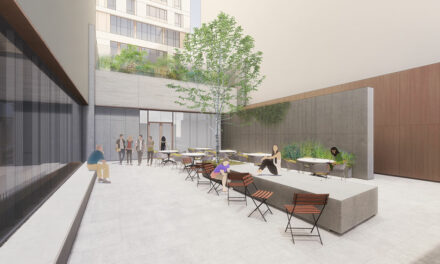Dr. Cheong Koon Hean, a widely acclaimed architect and urban planner credited with shaping much of Singapore’s urban landscape, has been named the 2016 recipient of the Urban Land Institute (ULI) J.C. Nichols Prize for Visionaries in Urban Development. Dr. Cheong, the 17th Nichols laureate and the first from Asia, was honored at a celebratory event during the institute’s 2016 Fall Meeting in Dallas.
The ULI J.C. Nichols Prize recognizes a person or a person representing an institution whose work demonstrates a commitment to the creation of communities that reflect the highest standards of design and development. The prize honors the legacy of Kansas City, Missouri, developer J.C. Nichols, a founding ULI member considered to be one of America’s most creative entrepreneurs in land use during the first half of the 20th century.
Dr. Cheong, whose extraordinary career in city building spans 35 years, is Chief Executive Officer of Singapore’s Housing & Development Board (HDB), which builds and manages public housing for more than 80 percent of the city-state’s population. With over 9 in 10 of them owning the homes they live in, it has one of the highest homeownership rates in the world. Since holding this position in 2010, she has overseen one of Singapore’s largest residential building programs to help address the high housing demand. She has also introduced HDB’s ‘Roadmap to Better Living in HDB Towns’, which guides HDB’s development of well-designed, sustainable and community-centric towns.
In 2004, Dr. Cheong became the first woman to be named CEO of Singapore’s Urban Redevelopment Authority (URA), where she had worked as an urban planner since 1990. In that capacity, Dr. Cheong played a key role in several transformative developments, including Marina Bay, a new vibrant live-work-play destination that created a signature skyline for Singapore. She championed the concept of creative placemaking to inject greater vibrancy not only at Marina Bay, but also in downtown areas such as the historic Singapore River and the civic and museum district at Bras Basah-Bugis. She was instrumental in the development of new growth areas at Kallang Riverside and Paya Lebar, as well as Jurong Lake District, transforming an industrial area into a new regional center with a vibrant community by introducing new housing, retail, and commercial uses.
Under Dr. Cheong’s leadership, the URA developed a conservation program that has been recognized by ULI as one of the most comprehensive conservation programs in Southeast Asia, balancing economic considerations with the need to safeguard Singapore’s heritage. She championed policies and urban plans to beautify Singapore with “sky rise” greenery, ample public spaces and urban art.
“What Dr. Cheong has accomplished in Singapore exemplifies what the Nichols Prize is about — being an urban visionary, taking chances, weathering the risks and producing ever better results,” says 2016 Nichols Prize Jury Chairman Marilyn J. Taylor, dean of the University of Pennsylvania School of Design in Philadelphia and a former ULI Chairman. “Cities face enormous challenges, and visionaries by definition bring a longer-term view – far beyond a single political term or a single process or project – as a way to achieve transformation. Highlighting long-term thinking in a time when societies tend to think in short-term increments is an important activity for ULI.”
Dr. Cheong’s approach to successful city building consists of being visionary and creative, and being willing to introduce new ideas and persevere with missionary zeal to see them through. “Singapore’s story is about how a land- and resource-poor city-state has managed to develop a highly livable, high-density city,” she says. “Long-term, comprehensive planning, thoughtful urban design, and responsible governance has helped us become more sustainable, livable and economically vibrant, bringing jobs and a better quality of life for our people.”
“Doing this has not come easy. It requires collective effort, innovative policies and plans, and dedicated and capable people, all supported by strong leadership. It is heartening that the Urban Land Institute recognizes the role of urban planners, many of whom work behind the scenes, to shape cities for a better future,” Dr. Cheong says.
Nichols Prize Jury Member Mark Johnson pointed to Dr. Cheong’s successful efforts to improve the quality of affordable housing — not just increase the quantity — for Singapore’s residents, with a special emphasis on keeping extended families closer together. In raising standards for housing design, she guided the transformation of Singapore’s public housing into award-winning projects, including The Pinnacle@Duxton, Waterway Terraces at Punggol, as well as SkyTerrace and SkyVille @ Dawson. “She has been very effective at finding new ways to make housing for families attainable, and at accommodating the many different cultures and ethnicities in Singapore in socially harmonious communities,” says Johnson, president of Civitas in Denver.
“The closeness of Singapore makes it imperative that housing is built as a community. Applying this to extended families opens up intergenerational and inter-ethnic opportunities – opportunities for people of all walks of life to be together, Johnson added. “The solutions to urban issues that Dr. Cheong has led in Singapore are showing the way for the rest of world. We are all headed toward living closer together, in more diverse communities, and she is demonstrating how to address this.”
In addition to Taylor and Johnson, other 2016 Nichols Prize jury members are: Dana Crawford, chairman, Urban Neighborhoods Inc., Denver; Ellen Dunham Jones, professor, School of Architecture, Georgia Institute of Technology, Atlanta; and Sir Stuart Lipton, a former Nichols Prize laureate and founder of Lipton Rogers Developments LLP in London.
Dr. Cheong frequently shares her expertise as a participant on planning and urban design panels around the globe. She helped to formulate the Sino-Singapore Tianjin Eco City Master Plan, and conceptualized the Lee Kuan Yew World City Prize, a biennial international award that recognizes cities and the leaders responsible for urban initiatives that display foresight and thoughtful governance. She is currently on the boards of the National University of Singapore, the Civil Service College, and the International Federation for Housing and Planning. Dr. Cheong has been awarded several national honors, including the Meritorious Service Medal for outstanding public service. She was recently conferred the Council for Tall Buildings and Urban Habitat’s 2016 Lynn S. Beedle Lifetime Achievement Award. She was also appointed the Tan Swan Beng Endowed Professor by the Nanyang Technological University in 2015. In 2014, she was inducted into the Singapore Women’s Hall of Fame, and in 2011, she received the Women Who Make a Difference award from the International Women’s Forum. In 2010, she was named Woman of the Year in Singapore by Her World magazine.
About the ULI J.C. Nichols Prize for Visionaries in Urban Development
The ULI J.C. Nichols Prize for Visionaries in Urban Development is funded by an endowment from the family of J.C. Nichols to the ULI Foundation. A management committee including ULI representatives and members of the Nichols family directs the prize program.
About the Urban Land Institute
The Urban Land Institute is a nonprofit education and research institute supported by its members. Its mission is to provide leadership in the responsible use of land and in creating and sustaining thriving communities worldwide. Established in 1936, the institute has nearly 40,000 members worldwide representing all aspects of land use and development disciplines. For more information, please visit uli.org or follow us on Twitter, Facebook, LinkedIn, and Instagram





